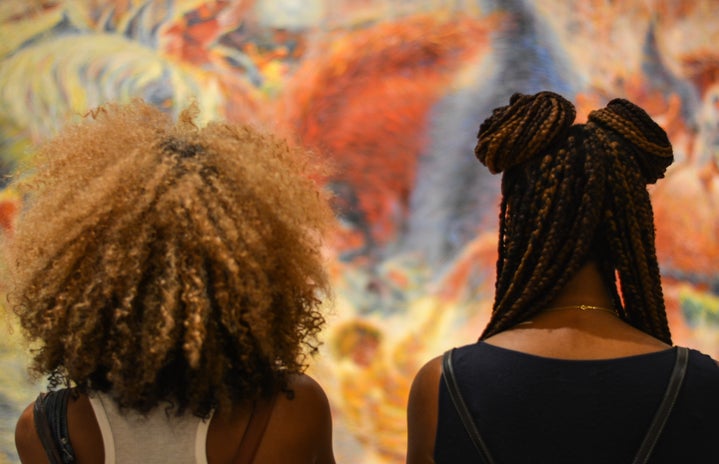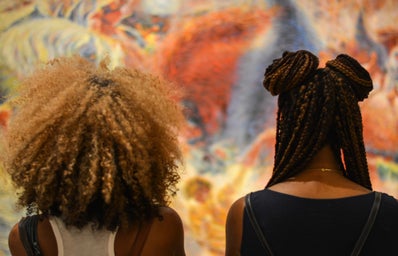Movies are one of my absolute favorite things of all time. I love the feeling of getting a ticket to see the next big film that hits my local AMC, whether it’s by myself or with friends. I’d definitely call myself an active film enthusiast. However, what I love just as much as film is live and musical theatre. As someone who has seen various Broadway productions and participated in theater in high school, it’s always been an important part of my life that I still haven’t separated from myself. I just love the feeling of immersion and excitement you get from live theatre, and seeing the actors portray these characters in the flesh is a feeling you can’t get even in the most realistic of live action films. With that being said, when I saw the trailer for Wicked and realized it was being released the same year, I was beyond excited. Although it wasn’t in my top musicals of all time (that belongs to Hadestown), I was thrilled to see Ariana Grande and Cynthia Erivo bring Glinda and Elphaba to the big screen.
For those who are unfamiliar with Wicked and the original story, Wicked is an adaptation of The Wizard of Oz with the main characters being Glinda the Good Witch (played by Ariana Grande) and Elphaba, AKA the Wicked Witch of the West (played by Cynthia Erivo). Elphaba, from the beginning of her life, has been an outcast because of her green skin. Her and her sister, Nessarose, are sent to the prestigious Shiz University, where we are first introduced to Glinda, who at the time goes by Galinda. From there, we immediately see that the lives of Glinda and Elphaba are completely different, with Glinda being the popular and smart student from a rich family, and Elphaba being the person no one wanted anything to do with. However, they end up as roommates, and Elphaba begins as a private student under Madame Morrible, who runs Shiz. After essentially hating each other for a good half of the film, having feelings of “unadulterated loathing” as said in one of my favorite numbers of the film, they soon become best friends. On top of Elphaba’s journey to discovering the meaning of true friendship and acceptance, she must face the fact that discrimination is rampant, as the city issues a decree that all animals are barred from teaching and are ultimately meant to be kidnapped and killed. Under Madame Morrible’s guidance, Elphaba gets invited to go to the Emerald City to meet The Wizard and use her powers to the fullest potential, and Glinda joins her on this journey. However, she quickly realizes that this isn’t the life that she wants or has dreamed of, and the film ends with the best final act I’ve ever witnessed in a movie theatre, AKA their rendition of the song “Defying Gravity.”
First of all, it’s extremely difficult to do a proper adaptation of a piece meant for the live stage. You really have to get all the details perfect, down to scenic design, vocal performances, even costumes and makeup. However, Wicked not only knocks everything out of the park, but sets a standard for adaptations that film hasn’t seen in years. The scenic design, acting, renditions of the musical numbers — literally everything — was done to a T. Its portrayal of the timelines of friendship, desire to be accepted, and harsh reality of discrimination and racism in society are perfectly translated to the big screen. However, the one theme that was portrayed perfectly, and the one big takeaway I’ve had looking at Wicked as a whole, is difference and learning to accept it.
The one scene in the entire film that moved me to tears was the ballroom dance scene, which to me is the core of Wicked. It begins with Glinda being given a wand by Madame Morrible at the request of Elphaba. Elphaba then walks in, dawning a black gown and a witch hat, and begins attempting to dance in the center of the ballroom while beingn laughed at and mocked by the other students. It emphasizes the fact that Elphaba just isn’t the same, and that society isn’t willing to accept a person with differences and flaws. However, the tone of this scene changes instantly once Glinda walks to the center of the ballroom and begins dancing with Elphaba, the same dance style and everything. Then, as the camera turns to Elphaba, she’s crying, but this time, Glinda is there to wipe the tears from her face, letting her know it’s OK, letting her know she can be herself around her. The second Glinda accepts her, everyone else is able to, and they realize that if Glinda, someone who is the polar opposite of Elphaba, can accept her and dance with her, they too can take her in. This is the beginning of Elphaba’s journey to discovering herself, and accepting herself with her differences rather than in spite of them. Even by the end, as Glinda stays behind with the very people that betrayed her, she stays grounded and true to herself. To me, this one singular moment spoke volumes and moved me in a way that I hadn’t been moved in a long time. I saw myself in Elphaba. I saw myself as the little girl who couldn’t be accepted anywhere because she was too “weird” to fit in, because everything about me was what everyone simply hated. Elphaba’s journey was my journey, and it was like my younger self was staring at me through the movie screen.
That’s what I feel Wicked has done more than every other movie this year: speak to a generation of people. Teach a lesson to millions of people and unite them under one feeling: acceptance. Being seen. I highly recommend that everyone see this film at least once, and I hope that it moves you the way it has moved me and countless others.



